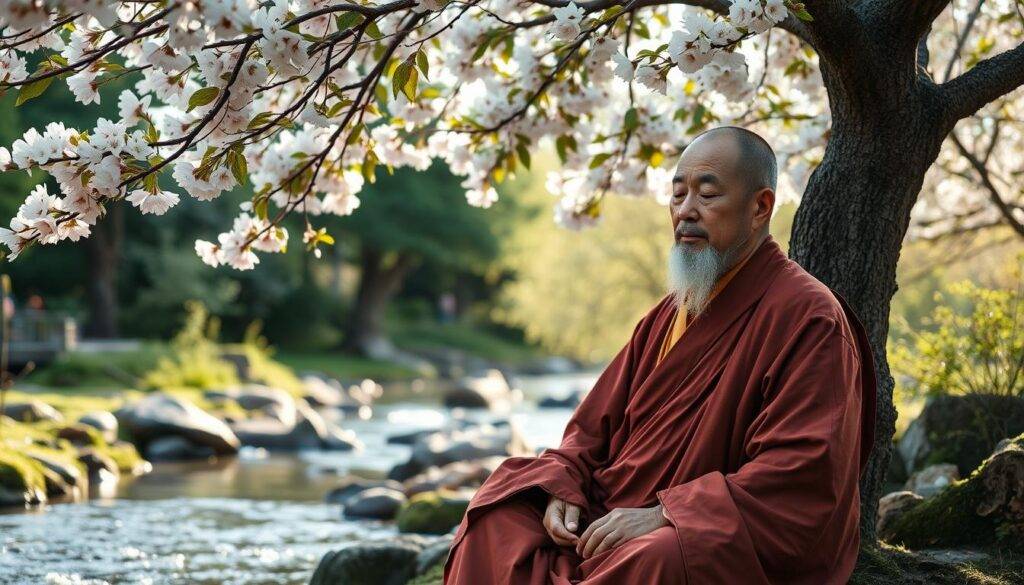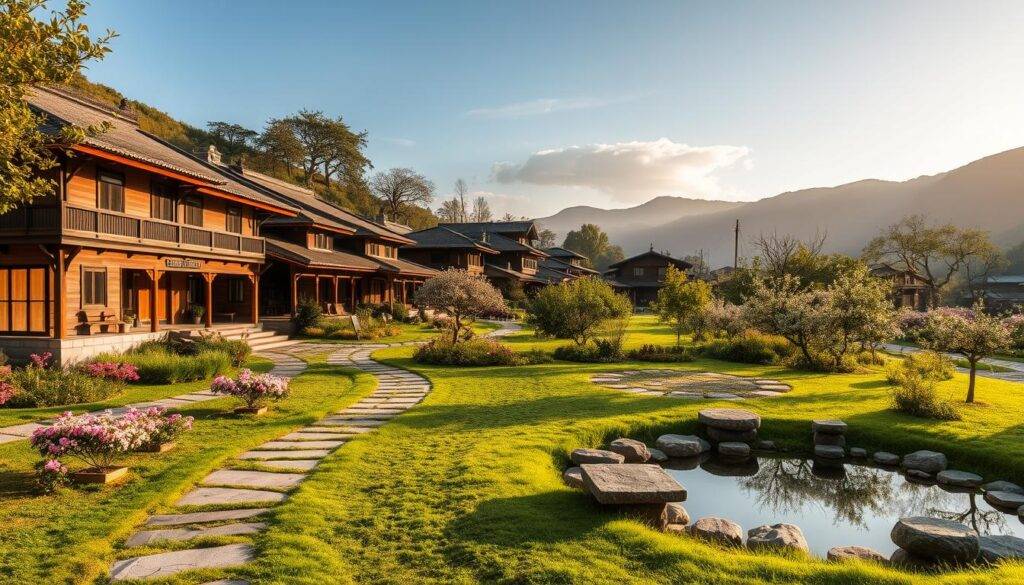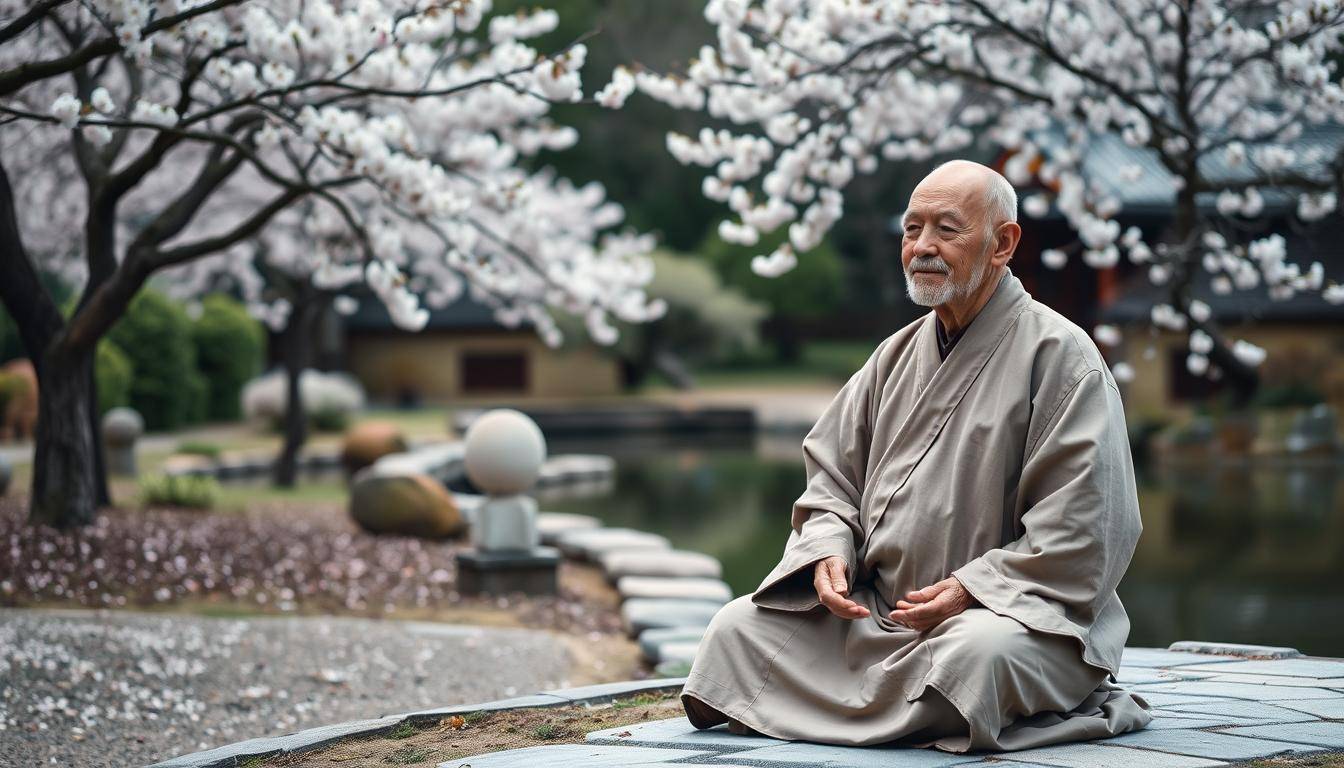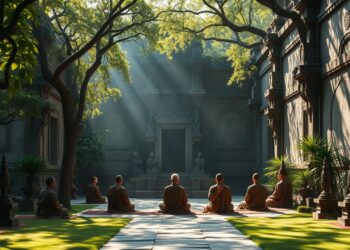“Feelings come and go like clouds in a windy sky. Conscious breathe in and out is my anchor.” – Thích Nhất Hạnh
Thích Nhất Hạnh, a famous Vietnamese Buddhist monk, peace activist, and bestselling author, has made a big impact. He is known as the “father of mindfulness.” His teachings have helped millions live more mindfully and with more compassion.
As a Zen master and spiritual leader, Thích Nhất Hạnh’s life shows the power of mindfulness and seeking peace. He started as a Vietnamese Buddhist monk and became a key figure in engaged Buddhism. His life’s work is about finding inner peace and bringing harmony to the world.
Key Takeaways
- Thích Nhất Hạnh was a renowned Vietnamese Buddhist monk, peace activist, and bestselling author.
- He was known as the “father of mindfulness” for his influential teachings on mindfulness and compassionate living.
- Nhất Hạnh co-founded the School of Youth for Social Services and the Order of Interbeing, and coined the term “engaged Buddhism.”
- He was exiled from Vietnam in 1966 for expressing opposition to the war and later founded the Plum Village Tradition in France.
- Thích Nhất Hạnh’s life and teachings have inspired millions to embrace a more mindful and peaceful way of life.
Life and Legacy of Thích Nhất Hạnh
Thích Nhất Hạnh was a famous Vietnamese Buddhist monk. He lived a life full of spiritual growth, fighting for justice, and seeking world peace. Born in 1926 in Huế, Vietnam, as Nguyễn Xuân Bảo, his path to becoming a Zen master and peace activist started early.
Early Years and Buddhist Education
At 16, Nhất Hạnh joined the Từ Hiếu Temple monastery. There, he studied Mahayana and Theravada Buddhism intensely. He also learned Chinese, English, and French.
But, he was not happy with his studies at Báo Quốc Buddhist Academy. So, in 1950, he left and moved to Ấn Quang Pagoda in Saigon. There, he became a monk in 1951.
Founding the Engaged Buddhism Movement
In the mid-1960s, Nhất Hạnh helped start the School of Youth for Social Services. He also created the Order of Interbeing. This group focused on engaged Buddhism, using Buddhist teachings to change society and politics.
His work for peace during the Vietnam War led to his exile in 1966. In 1967, Martin Luther King Jr. nominated him for a Nobel Peace Prize. King saw his dedication to nonviolence and peace.
Nhất Hạnh wanted to connect the spiritual and practical sides of Buddhism. He believed in using mindfulness and compassion to solve social problems. This idea, Engaged Buddhism, has inspired many around the world.
“The most important thing is to remember to come back to the present moment. This is the only way to truly live, and to truly heal.”
– Thích Nhất Hạnh
Thích Nhất Hạnh: Father of Mindfulness
Thích Nhất Hạnh, a famous Zen master, was called the “father of mindfulness.” His teachings on mindful living changed many lives. People sought inner peace and harmony through his guidance.
In his book Peace Is Every Step: The Path of Mindfulness in Everyday Life, Nhất Hạnh said, “If we are not fully ourselves, truly in the present moment, we miss everything.” This quote shows the heart of his teachings on mindfulness. He encouraged us to be aware and awake now.
Nhất Hạnh wrote over 100 books on meditation, mindfulness, and Buddhism. He sold more than five million books in the U.S. alone. He also started eleven monasteries, dozens of centers, and over 1,000 local communities. His community has over 600 monks and nuns, and thousands of lay students apply his teachings.
“If we are not fully ourselves, truly in the present moment, we miss everything.” – Thích Nhất Hạnh
Nhất Hạnh’s influence goes beyond his books. In 1966, he started the Order of Interbeing, a global Buddhist movement. It now has hundreds of monks and many lay teachers and communities. He also founded the Wake Up movement. It’s a worldwide effort of thousands of young people following his thích nhất hạnh mindfulness teachings.
Thích Nhất Hạnh’s work on the peace is every step philosophy has deeply influenced the world. His commitment to teachings on mindful living has inspired many. He showed the power of mindfulness in everyday life.

Exile and Advocacy for Peace
Thích Nhất Hạnh stood strong for peace and nonviolence during the Vietnam War. In 1966, he was forced to leave Vietnam for speaking out against the war. He went to the United States and Europe, becoming a key voice in the Buddhist peace movement.
He joined the Buddhist Peace Delegation for the Paris Peace Talks. He pushed for peace in the Vietnam War. Even after being banned from returning to Vietnam, he kept spreading his message of peace and compassion worldwide.
| Key Events | Dates |
|---|---|
| Thích Nhất Hạnh exiled from Vietnam | 1966 |
| Participated in Paris Peace Talks as part of Buddhist Peace Delegation | 1960s |
| Denied return to Vietnam after Paris Peace Accords | 1970s |
Nhất Hạnh’s dedication to peace made him a global advocate for nonviolence. His exile didn’t stop him from working for a more just world. He showed that love and compassion can change things.
“The essence of non-violence is love. Out of love and the willingness to act, and suffer if necessary, comes the power to move things forward, to get results. A non-violent approach may often be longer, but in the end it is more powerful.”
Continuing the Legacy of Peace
After exile, Thích Nhất Hạnh kept writing, speaking, and advocating for peace. He shared his wisdom of mindfulness and compassion globally. His work, like Plum Village, inspired millions to live more peacefully.
Establishing Plum Village and the Order of Interbeing
After being exiled from Vietnam, Thích Nhất Hạnh started Plum Village Monastery in southwest France in 1982. It became the heart of his teachings. He traveled the world, sharing mindfulness with many.
Spreading Mindfulness in the West
Nhất Hạnh also grew the Order of Interbeing. It’s a group of monks and laypeople living mindfully. The Order started in 1964 with six members and now has over 2,000 worldwide.
In 1992, the Order had its first big meeting. They set rules, chose leaders, and started regular meetings. Today, the Order has places to practice in the U.S., like in Vermont, California, and Mississippi.
“Peace is Every Step” walk led by Thích Nhất Hạnh and members of the Order of Interbeing on October 9th, 2005, at MacArthur Park in Los Angeles, California.
Thích Nhất Hạnh’s work has made a big difference. He has helped spread mindfulness and engaged Buddhism in the West. He teaches people and communities to find peace and change the world.

Return to Vietnam and Final Years
Thích Nhất Hạnh returned to Vietnam after 39 years away in 2005. In 2018, he went back to the Từ Hiếu Temple near Huế. This was where his spiritual journey started as a young monk.
At the temple, he spent his final years. He reflected on his life and the legacy he would leave. It was a peaceful end to his life’s work.
Thích Nhất Hạnh turned 92 and wanted to go back to his “root temple,” Từ Hiếu. He became a monk there in 1942, at 16. Despite a stroke four years before, he lived each day with joy and peace.
He aimed to build a community of compassion. He focused on healing, reconciliation, and transformation.
He arrived in Vietnam on October 26th. He rested for two days to recover. At Từ Hiếu Temple, he was welcomed with a procession and drums and bells.
He then asked his disciples to invite monks and nuns to a celebration on November 3rd. This was to reconnect with his spiritual roots and the community he had touched for decades.
Thích Nhất Hạnh, known as “Thay,” passed away at 95 on January 22, 2022. He left a remarkable legacy as a Zen Master, Peace Activist, and the Father of Mindfulness. His teachings inspire millions, guiding them to inner peace, compassion, and understanding.
“My actions are my only true belongings. I cannot escape the consequences of my actions. My body is the field, my consciousness the sower, and my behavior the seed that I continue to plant.”
– Thích Nhất Hạnh
Conclusion
Thích Nhất Hạnh’s life and teachings have made a lasting impact on the world. He is known as the “father of mindfulness.” His work has changed the lives of many people.
Through “engaged Buddhism,” he showed how Buddhist teachings can tackle social and political issues. This has inspired a new wave of peace activists. His teachings encourage people to find inner peace, compassion, and to live in the present.
Nhất Hạnh’s teachings on mindfulness and meditation have helped millions find calm in today’s busy world. His work for peace, even in war, has won him global respect. His writings and Plum Village community will keep inspiring us to build a kinder world.
Reflecting on Thích Nhất Hạnh’s life, we see the power of mindfulness, compassion, and engaged Buddhism. His teachings touch hearts and minds worldwide, crossing cultural and religious lines. His legacy will shape our conversations on peace and mindfulness for years to come.
FAQ
Who was Thích Nhất Hạnh?
Thích Nhất Hạnh was a Vietnamese Buddhist monk and peace activist. He was known as the “father of mindfulness.” He founded the Plum Village Tradition and promoted “engaged Buddhism,” which applies Buddhist principles to social reform.
What were Thích Nhất Hạnh’s early years and Buddhist education like?
Thích Nhất Hạnh was born Nguyễn Xuân Bảo in 1926 in Huế, Vietnam. At 16, he entered the Từ Hiếu Temple monastery for Buddhist training. He later left to live at Ấn Quang Pagoda in Saigon, where he was ordained as a monk in 1951.
How did Thích Nhất Hạnh become a leading voice in the engaged Buddhism movement?
In the mid-1960s, Thích Nhất Hạnh co-founded the School of Youth for Social Services and the Order of Interbeing. He was exiled from South Vietnam in 1966 for opposing the Vietnam War. Despite exile, he continued advocating for peace and nonviolence, participating in the Paris Peace Talks.
Why was Thích Nhất Hạnh known as the “father of mindfulness”?
Thích Nhất Hạnh wrote a lot about mindfulness, encouraging people to be aware in the present moment. His book “Peace Is Every Step” changed many lives, helping people find inner peace and harmony.
What was Thích Nhất Hạnh’s legacy after being exiled from Vietnam?
After exile, Thích Nhất Hạnh founded the Plum Village Monastery in southwest France in 1982. From there, he traveled the world, teaching mindfulness. He also grew the Order of Interbeing, a community dedicated to his teachings.
How did Thích Nhất Hạnh’s final years unfold?
Thích Nhất Hạnh was allowed to visit Vietnam in 2005 after 39 years of exile. In 2018, he returned to Vietnam to live at his “root temple,” Từ Hiếu Temple near Huế. He spent his final years there, reflecting on his life and legacy.




























































